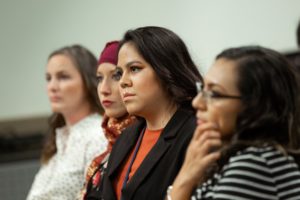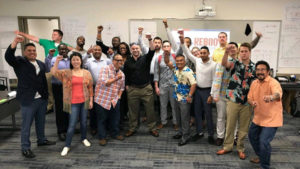After spending years, even decades, in the military service, transitioning into the civilian workforce can prove to be daunting for some of the 200,000 men and women who make the move each year. There are practical challenges to navigate — translating your military skills into a good civilian resume, bringing your skills up-to-date for jobs that have changed since you joined the military, and more.
“The goal is that you take your uniform off on a Friday, and on Monday you go to work in your chosen field,” explains Maurice Wilson, a U.S. Navy veteran and the president and executive director of National Veterans Transition Services, Inc (NVTSI), a San Diego-based nonprofit committed to helping veterans find rewarding careers nationwide.
Wilson says over the years the military has made improvements in how it gets out information to military personnel preparing to leave the service. One of the programs — the Transition Assistance Program (TAP) — is mandatory for service members preparing to transition into civilian life. But, he adds, it’s not enough.
“The military doesn’t take you through a real transition process, not like coming into the military,” he says. “Boot camp is an eight-week process that prepares you for military service. Eight weeks of behavior modification. It’s pretty intense,” explains Wilson. “No one prepares you mentally, behaviorally for that (civilian) transition, so we decided to be the first.”
A decade ago, Wilson launched REBOOT Workshop, an NVTSI program designed to reintegrate service members through something he describes as a “reverse boot camp.”
REBOOT focuses on three areas that Wilson believes are necessary for a successful transition from the military — Personal Identity, Lifestyle Transition, and Career Transition.

The whole approach is based on behavior-based training Wilson received 20 years ago while working in workforce development at the Urban League. It included helping prepare prisoners to reintegrate into society. That training, says Wilson, is at the core of REBOOT.
“Nobody was doing this reverse boot camp, but since I had been doing that at the Urban League for ten years prior, it was a no-brainer for me. Why not just configure the program towards the veterans?” he asked when coming up with a program for transitioning veterans.
To date, more than 2,500 active service men and women have gone through the three-week workshop.
The program begins with a deep dive into your personal identity. “Who are you once you leave the military? Who are you now that you no longer wear the uniform when you stop saying ‘I’m Sergeant this’ or ‘I’m Chief that’?” Inner purpose and passion is another area of focus.
Wilson says taking a look at who you are, or want to be, in this next stage of your life. This first phase of REBOOT was designed to address a large number of transitioning service members — 86 percent, according to one study — wanting to change their careers, but being unable to identify what they want to do next.
“We are thinking proactively. Let’s get ahead of the curve and let’s get you thinking about what you want. Let’s start positioning you towards those things that you want,” explains Wilson.


Among the early class of participants was Otto Delacruz, a Navy veteran and self-described skeptic who had Wilson as an instructor. “In the very beginning, I was kind of like, okay this sounds like a lot of B.S., pardon my expression,” recalls Delacruz, now 48. “But I told myself, I’ve got nothing to lose, let’s give this a shot.”
By the second day, he was sold and rethought his plan to continue working as an air traffic controller, the job he held in the Navy. “I never thought I’d ever have a bachelor’s degree because I left Jersey with a high school diploma, joined the military, did 20 years, and that was it. I thought that was the end of it. But it ignited this thing in me,” says Delacruz.
After leaving REBOOT, he attended college and is now in a master’s program for organizational leadership. He’s currently a senior facilities manager at San Diego State University Research Foundation. “At the end of the day, all of this stems from those three weeks,” Delacruz adds of his REBOOT program.
Twenty-four-year-old Taya McCormick, a Navy yeoman leaving the military in December, also had a change of heart about her career plans during a recent REBOOT workshop. Instead of continuing her studies in computer science, she decided to tap into her real interest in becoming an art therapist for troubled kids. As an orphan from Russia who was adopted at age eight, she realized, “that’s my real passion to work with orphans and troubled kids because no one understands them.”
Once service members identify what they want to do, REBOOT connects them with partners who provide training since the organization itself, NVTSI, does not provide technical skills training. The next step is connecting service members with employers who partner with the program.

It all sounded appealing to Sharaine Robinson, a 27-year-old single mother serving as a Navy fighter. She plans to exit the military in August after more than a decade of service. She recently attended a workshop for women only. “What a better platform for me to talk about issues that a lot of men don’t have to think about, like who’s going to take care of my child?” explains Robinson.
Before attending REBOOT, she said she was “terrified” about her transition into the civilian workforce. “To feel all over the place like you don’t have control over your life, like life is slipping through your hands, that’s a very scary feeling,” she adds.
Staring at the exit doors, she credits the workshop with helping her clarify a plan and says she’ll tap into the mechanical engineering skills she developed in the Navy. She plans to apply to a Department of Defense jobs program called SkillBridge, which allows service members to enter apprenticeships with participating civilian employers during the final 180 days of their service.
Her ultimate goal, though, is to be an anesthesiologist and plans to study for that while working. Envisioning a path, Robinson no longer describes herself as “terrified” about her transition into the civilian workforce.
Coming up with a career plan is key. But Robinson tapped into something else during the workshop, recalling that she’s lived by the motto “ship, shipmate, self” for the last 10 years, not realizing she neglected herself. “It’s emotional because you just don’t even realize how much you’ve lost yourself and how much you don’t even know about yourself,” she explains.
Getting that plan into place and connecting with employers is what REBOOT aims to do, but Wilson stresses the final phase is to connect those transitioning service members with veterans service organizations in their community so they have a support system and are not walking out of the military on their own as they adjust to civilian culture.
Wilson would like to expand and enhance the reverse boot camp process to extend it to all military personnel that making that transition out of the military. “We want to open a lot of people’s eyes and get many other organizations to join as a team,” stresses Wilson. “We cannot do this by ourselves.”
Follow more of our Vets Deserve Good Jobs coverage here.
© Copyright 2024 by Structural Unemployment, LLC dba WorkingNation